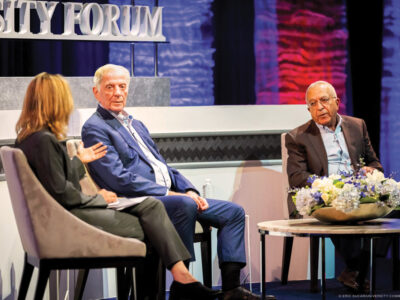
“If we were starting today, who would invent Iraq the way it is?” Dr. Brendan O’Leary asked. It was a rhetorical question, with a clear answer. “No one.”
The question in the wake of the American-led invasion, is how to reinvent that troubled state, now that Saddam Hussein’s Baath Party has been deposed. For some answers, the Gazetteturned to O’Leary: professor of political science, Stanley I. Sheerr Endowed Term Chair in the Social Sciences, and director of the Solomon Asch Center for the Study of Ethnopolitical Conflict. An international authority on national and ethnic conflict-regulation and power-sharing systems, O’Leary spoke to Gazette senior editor Samuel Hughes in late March, shortly after the invasion of Iraq had begun.
Gazette: Iraq was a British colonial creation, a crazy quilt of Sunni, Shi’ia, Kurds, and Turkmen, united only by the iron hand of Saddam Hussein. Can we really hope to do better by imposing a democratic state on it?
O’Leary: Any American imposition won’t work. Any U.N. imposition won’t work. What the U.N. and America can do after an invasion is create the circumstances in which there are genuinely free negotiations between representatives of Sunni, Shiite, Kurdish, and Turkmen groups. The United States should be very careful about avoiding any particular formula, and should not advocate anything other than freely negotiated arrangements of a democratic character. The actual model of how Iraq should be has to be up to the people of Iraq.
My own view, which is born out of sympathy for the Kurds, is that the Kurds have had the rawest deal out of the history of Iraq. They’ve been the people most frequently coercively assimilated, the ones who have been subject to genocide. And for obvious reasons they don’t want to lose the already precious level of autonomy that they have. For that reason, Kurds are arguing for an Iraq that will be a fully fledged federation which recognizes two peoples: Kurds and Iraqis. That’s an entirely reasonable posture. But the Kurds know that they can’t expect the rest of Iraq automatically to accept that particular formula.
Gazette: Why not?
O’Leary: There’s one obvious reason: the Shi’ia, even though they’re internally heterogeneous themselves, are very plainly a majority—a demographic majority and an electoral majority. In the event of the overthrow of Saddam’s regime, they’re going to be in a highly majoritarian mood. They’re going to think, “Well, it’s our turn now.”
For that reason I expect the Shi’ia to favor a centralized Iraq and the Kurds to favor a federal Iraq. And, ironically, I expect the defeated Sunni communities to be rather interested in a federal Iraq as well, to avoid the possibility of a Shi’ia backlash.
So what can happen? I think the most obvious thing would be for the Kurds to have a federal relationship with the new Baghdad government, one which grants them sovereignty but not independence; which gives them a form of domestic, public-policy autonomy, what is called a “federacy,” a share in the oil revenues in proportion to their population, and some level of representation at the center—basically a minimal hand from Baghdad running the internal affairs of Iraqi Kurds.
Some of the Sunni communities have deeply collaborated with Saddam Hussein’s regime; they can’t expect, therefore, very generous treatment from the other communities of Iraq. So the most likely configuration is a deal between Shi’ia and Kurds at the expense of Sunnis. But the international communities will try to prevent the Sunnis from losing too badly and suffering in the way that the Kurds have suffered in the past.
Gazette: What are the most dangerous flashpoints in postwar Iraq?
O’Leary: I think that the deepest threat at the moment would be a decision by the Turkish military to abandon Turkey’s aspirations to enter the European Union. They crushed and disorganized the Kurdish forces within Turkey, and they have a deep paranoia that Iraqi Kurdistan will become the mechanism for the formation of a Kurdish nation-state that would cut into Turkish borders eventually. So they’re trying to use the argument that—for humanitarian reasons, to protect refugees—they need to have Turkish forces present in Iraqi Kurdistan. I think that’s a recipe for conflict between Kurds and Turks. And it’s even a potential recipe for conflict between Americans and Turks and Kurds because, if there is such a conflict, the Americans and the British will have to intervene between those forces. And they’ll be the pigs in the middle, so to speak.
Gazette: What sort of electoral provisions, and checks and balances, would be needed in this postwar Iraq?
O’Leary: I think if we saw Iraqi Kurdistan as a separate unit—self-governing, not internally divided—the Kurds of Iraq would probably adopt an electoral system of proportional representation, and probably a power-sharing administration, because they’re divided between two main political parties and two formidable political leaders. So they’ll need to have a form of cooperative government which avoids zero-sum politics that would send them into civil war.
And the rest of Iraq, if they agree on a decentralized unitary state outside of Iraqi Kurdistan, then the key thing will be to get political parties formed which are not straightforwardly sectarian, representing just the Sunni interests or just Shi’ia interests. Constitutional architecture deeply matters; electoral systems really matter; but it’s the parties that run them that are ultimately crucial.
Gazette: How would you compare the situation in Iraq to that in Afghanistan?
O’Leary: Afghanistan is one of the least developed countries in the world by any possible standard. That’s not true of Iraq. The very fact that there can be a serious discussion about whether or not Iraq possesses weapons of mass destruction is a discussion of how developed Iraq is. There’s no question that the skill level of the population is quite high. On the other hand, Iraq has been a developmental disaster as a result of the sanctions policy. The sanctions policy in some respects has inflicted greater harm to Iraq’s population and Iraq’s economy than either the war of ’91 or the current war.
So you have a very developed population, you have plentiful resources, and I think you have the capacity for effective reconstruction of a much higher order than is the case in Afghanistan. But like Afghanistan, what’s completely unclear is whether you can have sufficient political reconciliation to create a stable political order in which winners and losers both have a stake. I think it’s possible, but it will require very, very careful attention. An American administration and an American military administration would be a recipe for getting America involved in a long-term colonial protectorate —not in the U.S.’s interests, and not in the interests of Iraq.
I expect the administration to be pressured by the British and by Europeans to allow the U.N. to be the formal runners of any interim administration in postwar Iraq. Then the question will become, who pays the bill for that? And in what manner is the bill paid? And the answer to that question will tell you something about what the pattern of reconstruction is likely to be. If it’s clear that resources from oil and if Iraqi exports are used for regeneration, rather than paying [America’s] costs of the war, then Iraq, I think, could recover quite quickly—more quickly than some imagine.
The interesting thing for America is that a democratic, reconstructed Iraq will want a different settlement to the Israel-Palestine question than the one that tends to be preferred by the neoconservative hawks around the Bush administration. That will be a difficulty for them, because nobody is going to be elected in Iraq who basically endorses a “Let’s be friends with Ariel Sharon” platform.
So I think that in the reconstruction moment, we’re going to get a great deal of pressure from the European Union on the Americans to coerce Sharon and to settle the Palestinian issue decisively and fairly. And the renewal of Iraq will repose that question. The nightmare for America is to be involved in colonial administration in Afghanistan and Iraq and supporting Israel at the same time as it may have to deal with very serious questions in North Korea and conceivably in Iran as well.
So they’re going to have to be very careful. They’ve been very audacious; whatever one’s appraisal of the merits of what they’ve done, no one can dispute its audacity and its boldness. Whether they thought everything through politically remains to be seen.
Gazette: What’s your take on the American internal debate about the war?
O’Leary: As a European, what struck me is that the debate took place around a relatively old set of concerns. It seemed to me I was hearing echoes of the debate about the Vietnam War, not about the specifics of the Iraq question. The administration falsely posed significant connections between Al Qaeda and the Hussein regime. The opposition falsely and erroneously didn’t treat the question of weapons of mass destruction seriously. So in both cases you’ve got a kind of national-security argument around Al Qaeda, which sounded like the old arguments around Vietnam—that we can’t give in anywhere, because if we do, there will be a domino effect and we’ll be destroyed. And you have an anti-war sentiment which was simply anti-colonial, and didn’t really address the depths of repression attached to Saddam Hussein’s regime. The paradoxical thing is that any balanced appraisal would say that war without international U.N. authorization is illegitimate; with U.N. authorization it would have been much better. Irrespective of whether it’s fought under U.N. auspices or not, it’s probably far better for the people of Iraq and the region as a whole that there be a significant international commitment to a reconstruction of the region, rather than a rapid American pullout.




